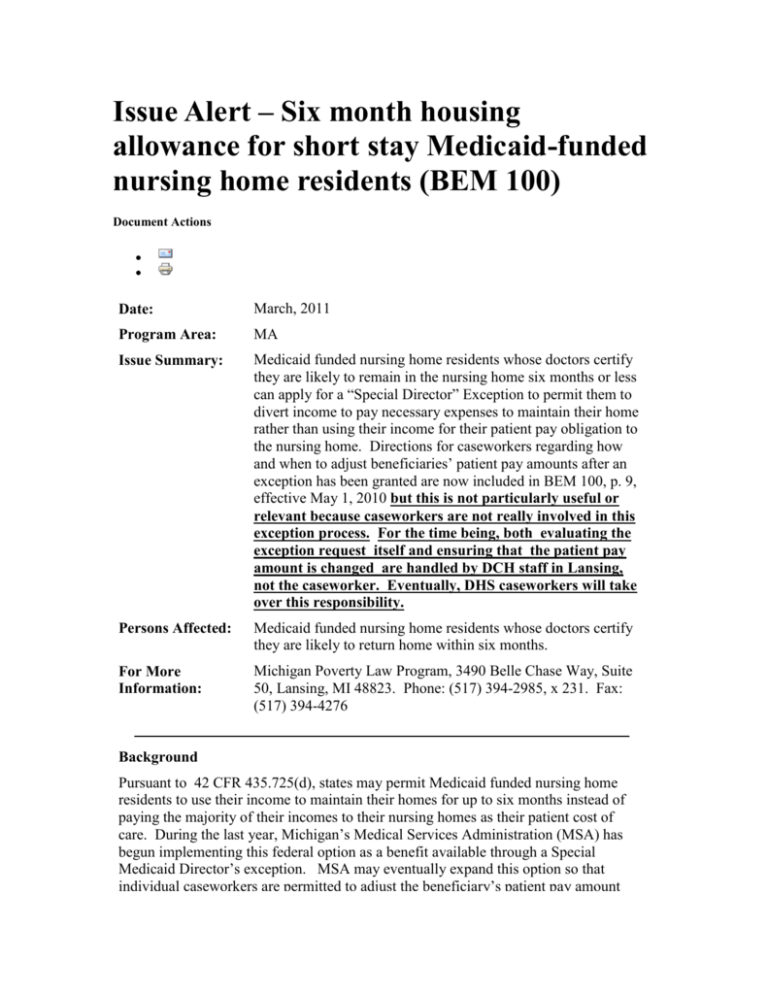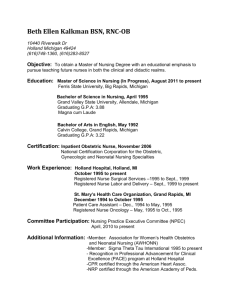Issue Alert - Michigan Poverty Law Program
advertisement

Issue Alert – Six month housing allowance for short stay Medicaid-funded nursing home residents (BEM 100) Document Actions Date: March, 2011 Program Area: MA Issue Summary: Medicaid funded nursing home residents whose doctors certify they are likely to remain in the nursing home six months or less can apply for a “Special Director” Exception to permit them to divert income to pay necessary expenses to maintain their home rather than using their income for their patient pay obligation to the nursing home. Directions for caseworkers regarding how and when to adjust beneficiaries’ patient pay amounts after an exception has been granted are now included in BEM 100, p. 9, effective May 1, 2010 but this is not particularly useful or relevant because caseworkers are not really involved in this exception process. For the time being, both evaluating the exception request itself and ensuring that the patient pay amount is changed are handled by DCH staff in Lansing, not the caseworker. Eventually, DHS caseworkers will take over this responsibility. Persons Affected: Medicaid funded nursing home residents whose doctors certify they are likely to return home within six months. For More Information: Michigan Poverty Law Program, 3490 Belle Chase Way, Suite 50, Lansing, MI 48823. Phone: (517) 394-2985, x 231. Fax: (517) 394-4276 Background Pursuant to 42 CFR 435.725(d), states may permit Medicaid funded nursing home residents to use their income to maintain their homes for up to six months instead of paying the majority of their incomes to their nursing homes as their patient cost of care. During the last year, Michigan’s Medical Services Administration (MSA) has begun implementing this federal option as a benefit available through a Special Medicaid Director’s exception. MSA may eventually expand this option so that individual caseworkers are permitted to adjust the beneficiary’s patient pay amount without first obtaining approval from the Medicaid Director. What's Happening? MSA now has the capacity to change the patient pay amount in DHS’s Bridges computer system when an exception request is approved. Originally, once MSA approved an exception request, it would reduce the patient pay amount to zero. More recently, MSA has reduced the patient pay amount only by the amount of expenses the beneficiary submits. We understand that for administrative ease, MSA plans to reduce the patient pay amount by a standard amount in the future regardless of the actual housing costs the beneficiary submits. We understand that most requests are being granted within a couple weeks and that the process is going quite smoothly in most cases. MSA reports it gets more requests each month. If requests do not have adequate paperwork or more information is needed, MSA staff contact the person requesting the exception to explain what is needed. Denials are generally issued for the following reasons: the resident is an SSI recipient (and therefore has no patient pay amount that could be adjusted), the resident has left the nursing facility (although a request may occasionally be approved even after the resident leaves the facility in compelling cases), or the resident is not a Medicaid beneficiary. In addition, denials are issued if the resident has already received a six month allowance during a previous stay or stays or has been in the nursing home longer than 6 months. Otherwise, most requests are approved. *Update 8/8/11: Individuals should always apply for an exception while they reside in the nursing home. If they apply after they leave the facility, the request will be denied. If a patient pay amount has not been established by DHS before the resident leaves the facility, the exception request will be denied but the recipient will be informed that he or she can reapply for the exception once the patient pay amount has been established. If an individual applies for Medicaid while in the facility but returns home before the Medicaid application has been approved, the Bridges system should not establish a patient pay amount for the resident’s stay and no exception will be required. Some DHS workers are hand calculating a patient pay amount in these circumstances; this practice should be reported to the Medicaid Policy office at DCH and the patient pay amount should be rescinded. What Should Advocates Do? .Advocates for Medicaid beneficiaries in nursing home who seek to maintain their homes and whose doctors are willing to certify they are likely to go home within six months should request an exception. Nursing home staff may also make requests on behalf of residents. To do so they must provide: 1.Authorization to disclose protected health information, DCH-1183 available at www.michigan.gov/mdch . Applicants MUST use this form; no other release will be accepted even though this form is cumbersome and bureaucratic. 2. Proof of housing expenses, such as rent or mortgage payments , utilities, real estate taxes, and telephone (to keep service on).. Expenses such as car payments or auto insurance and internet fees are not countable as a Medicaid expense. 3. Physician statement verifying this individual is medically likely to return home within six months. The physician’s name should be printed legibly along with his or her qualification (M.D. or D.O.) and the physician statement should include the resident’s date of admission to the facility. The information should be submitted to: Special Director Exception Request Eligibility Policy Section P.O. Box 30479 Lansing, MI 48909 Verifications may also be faxed to (517) 241-8969. Advocates should indicate on the cover sheet the verifications pertain to a Special Director Exception Request. Applications can also be to emailed directly to the staff person who handles these requests: Anne Kennedy: KennedyA@michigan.gov. Issues to be addressed: 1. Some doctors are refusing to take the time to write the necessary letter for residents. 2. Nursing homes have complained in the past that they do not receive reimbursement promptly from the state to make up for the lost patient pay funds. 3. Most residents and many advocates and professionals remain unaware of this program. 4. MSA has failed, despite repeated requests, to issue a simple instruction sheet advising applicants how to submit these requests. 5. We have asked the Department to reconsider the policy of denying applications because the resident has been in the nursing home more than six months, even if he or she will be leaving the facility within the next 6 months since these denials are not clearly required by federal law. Finding Help Long-term care ombudsman, Centers for Independent Living staff, Home and Community Based Waiver Program staff, and staff of the Michigan Poverty Law Program and Michigan Disability Rights Coalition have experience requesting these exception requests. For assistance with a request that has already been submitted, contact the Michigan Poverty Law Program or the Michigan Disability Rights Coalition. Send comments or questions about the site to the webmaster by filling out our Feedback Form. Please do not email us with requests for legal advice. The webmaster cannot give legal advice. Copyright © 1997-2009 Michigan Poverty Law Program




